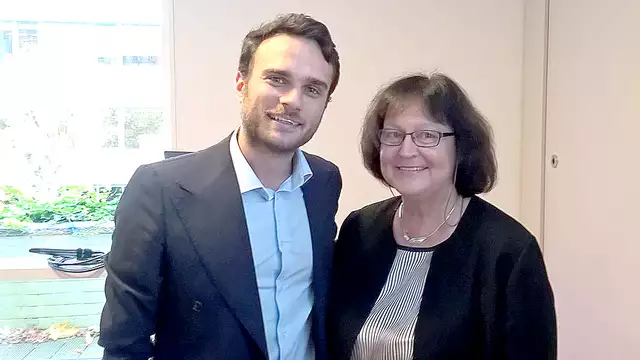
Arcada project in SME internationalisation highlighted as best-practise example for European employers’ organisations
Published: 27.11.2017 / Research
UEAPME is an umbrella organisation for European employers’ organisations with a member count of more than 12 million small and medium sized companies (SMEs). When UEAPME arranged a seminar together with the member organisation EBC in Brussels on 23 November, Arcada’s project EDU-SMEs took centre stage. The project was presented as a best-practise example of how projects can both support smaller businesses and create new co-operation platforms for SMEs and higher education institutions across national borders.
Eija Källström, project manager for EDU-SMEs and lecturer in business administration at Arcada, presented the project in Brussels. She was thrilled that it was one of few selected projects that were showcased during the seminar. The participating EU financial programmes, such as Central Baltic (which finances EDU-SMEs), Horizon 2020 and Erasmus+, were only represented by one project each.
“We’ve been working with a long-term perspective at Arcada to gain competences and to expand our networks in this field,” Källström says. “We have a substantial project portfolio in SME internationalization, and the related project NOBANET has for example already been showcased by the European Commission External link as an example of how the business sector and the academic world can co-operate to support internationalisation. What is so exciting now is that it’s the employers side that wants to highlight our way of working. It creates great visibility and also offers opportunities to make new important connections.”
The presentation gained a lot of attention in Brussels, and EBC’s secretary general Eugenio Quintieri was one of the participants who saw huge potential for EDU-SMEs’ methodology also on a European level.
“We want to focus on programmes and projects that can add real value to SMEs,” he concluded.
EDU-SMEs, which includes universities of applied sciences in Finland, Estonia and Latvia, is based on the idea that the academic world and companies have much to gain from closer co-operation regarding internationalisation. The UASs help companies reach their target markets, while the participating students get the opportunity to work on real cases and gain valuable knowledge and experience already during their student years. The project has also seen a new e-course take shape, “International business strategies of SMEs”, and new technology, such as webinars, have been used to gather companies from all countries.
According to Källström one explanation for the project’s continued success is the focus on creating great networks.
“When it comes to internationalisation, good networks are paramount,” she says. “Arcada has wide co-operation networks that link to markets abroad and can increase our projects’ impact. This isn’t something that has been built overnight, but is the result of many years of hard work.”
Find out more about EDU-SMEs here.


